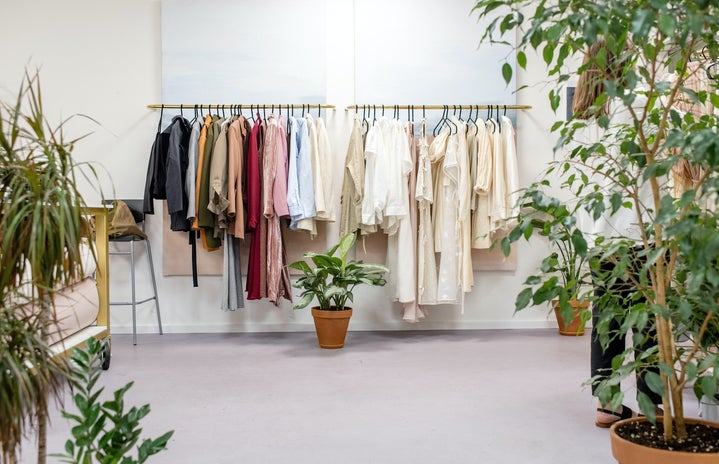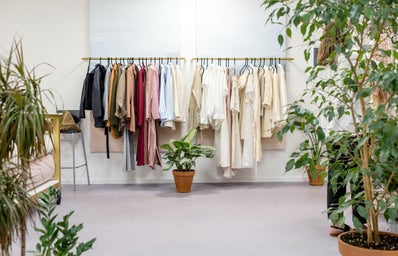The phrase ‘fast fashion’ has been the topic of conversation on many social media platforms, making ‘sustainability’ and ‘ethicality’ priorities for most modern consumers.
Companies like Shein and Romwe have been the focal point of this discussion since growing even more popular on TikTok around March 2020. What started off as excitement for a ‘new’ brand that is consistent with clothing trends, gradually turned into disillusionment and contentions with fast fashion as a whole.
According to the Group Against Smog and Pollution (GASP), the fast fashion industry is responsible for 10% of global annual emissions. Although that may not seem like a lot, it is also the second-largest consumer of global water supply with the number of textiles made. “A staggering 85% of textiles go to the dump each year,” even after using enormous amounts of energy and water. Why does this matter? Millions of textiles are thrown and or burned in landfills every second, causing more pollution and harming the ozone layer further.
Now, many are trying to find ways to shop more sustainably. While this means helping the planet, this also can hurt wallets, as most sustainable brands are expensive due to ethical business practices. This is leaving many feeling confused, raising questions like: how can we continue to shop? How can I know which stores are sustainable? What can I do? I am just one person.
It is important to acknowledge that for the average person, individually, the Earth’s environmental issues are not the fault of our own, but corporations that refuse to look into more sustainable manufacturing processes. That being said, there is nothing wrong with trying to do our part, no matter how seemingly small, to help the planet.

Understanding ‘Greenwashing’
Greenwashing is a form of marketing in which companies guise their poor business practices regarding environmental impact with misleading information that makes their product(s) sound more environmentally friendly.
Shein is one of the biggest culprits of this, since being coined as one of the worst fast fashion brands. With one look onto their “Social Responsibility” page, it may seem like accountability is being taken, but their claims are extremely vague, which raises questions about the credibility of said claims. The lack of resources, elaboration, and evidence for their self-proclaimed ‘fair labor practices’, recycling program, is a quintessential example of greenwashing. This is not just popular with Shein however, brands like Nike, Urban Outfitters, and Gap are a part of the problem as well.
This video by ImperfectIdealist on Youtube further explains Shein’s labor practices as well as the concept of greenwashing. Their channel centers around being environmentally friendly with a focus on fast fashion.

Which brands can I trust? What can I do?
Websites like Good On You are credible sources for finding out which brands one can support. With ratings on labor practice, environmental safety, and animal abuse, it is accessible and easy to navigate. Ultimately, it is up to you, the consumer, to decide.
The bigger problem, however, is over-consumption. This is where we need to ask ourselves: “Is this a need?”, “Am I going to want to wear this, even if it goes out of style?”, or “Is this quality going to last me for years?”
Maybe, instead of going onto Shein for cheaper clothes with not-so-great quality, try a local thrift store, (as aforementioned, there is a lot of clothes on this Earth, so there are many choices to pick from) or platforms like Depop and Poshmark where people resell items. Reselling will always be a better option than support fast fashion brands.
If staying ‘on trend’ is what is keeping you hesitant, as fashion trends are moving more rapidly than ever, ask yourself why staying ‘on trend’ is even important. Building your own style with pre-loved good quality and or authentic pieces is not only more sustainable but can make fashion more personal and exciting.
Personally, what I found helpful was making Pinterest boards with outfits and pieces that I liked. Along with that, I would find people on TikTok that were interested in sustainable fashion practices that offer tips and share their own findings. (like @tinyjewishgirl, @trecholopis, @oldloserinbrooklyn, @mariegaguech, and my personal style inspiration, an account capturing NYC street-style in real-time, @nyctrends)
Overall, although being environmentally consciousness especially with clothing, can seem stressful, just know that doing whatever you can, no matter how seemingly insignificant, is one step closer to a greener Earth.



